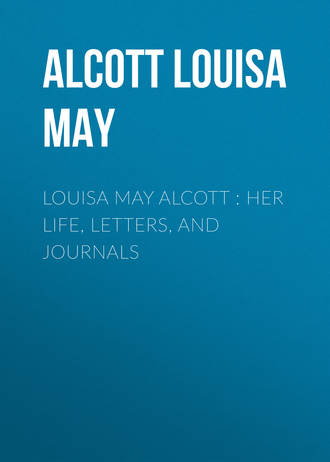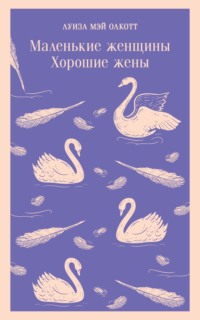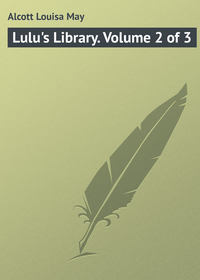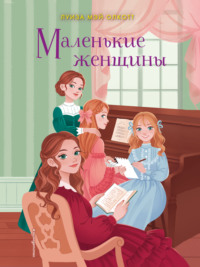 полная версия
полная версияLouisa May Alcott : Her Life, Letters, and Journals
Miss Wealthy Stevens paid for the book, and I received $32.
[A pleasing contrast to the receipts of six months only in 1886, being $8000 for the sale of books, and no new one; but I was prouder over the $32 than the $8000.–L. M. A., 1886.]
April, 1855.–I am in the garret with my papers round me, and a pile of apples to eat while I write my journal, plan stories, and enjoy the patter of rain on the roof, in peace and quiet.
[Jo in the garret.–L. M. A.]
Being behindhand, as usual, I'll make note of the main events up to date, for I don't waste ink in poetry and pages of rubbish now. I've begun to live, and have no time for sentimental musing.
In October I began my school; Father talked, Mother looked after her boarders, and tried to help everybody. Anna was in Syracuse teaching Mrs. S–'s children.
My book came out; and people began to think that topsey-turvey Louisa would amount to something after all, since she could do so well as housemaid, teacher, seamstress, and story-teller. Perhaps she may.
In February I wrote a story for which C. paid $5, and asked for more.
In March I wrote a farce for W. Warren, and Dr. W. offered it to him; but W. W. was too busy.
Also began another tale, but found little time to work on it, with school, sewing, and house-work. My winter's earnings are,–

if I am ever paid.
A busy and a pleasant winter, because, though hard at times, I do seem to be getting on a little; and that encourages me.
Have heard Lowell and Hedge lecture, acted in plays, and thanks to our rag-money and good cousin H., have been to the theatre several times,–always my great joy.
Summer plans are yet unsettled. Father wants to go to England: not a wise idea, I think. We shall probably stay here, and A. and I go into the country as governesses. It's a queer way to live, but dramatic, and I rather like it; for we never know what is to come next. We are real "Micawbers," and always "ready for a spring."
I have planned another Christmas book, and hope to be able to write it.
1855.–Cousin L. W. asks me to pass the summer at Walpole with her. If I can get no teaching, I shall go; for I long for the hills, and can write my fairy tales there.
I delivered my burlesque lecture on "Woman, and Her Position; by Oronthy Bluggage," last evening at Deacon G.'s. Had a merry time, and was asked by Mr. W. to do it at H. for money. Read "Hamlet" at our club,–my favorite play. Saw Mrs. W. H. Smith about the farce; says she will do it at her benefit.
May.– Father went to C. to talk with Mr. Emerson about the England trip. I am to go to Walpole. I have made my own gowns, and had money enough to fit up the girls. So glad to be independent.
[I wonder if $40 fitted up the whole family. Perhaps so, as my wardrobe was made up of old clothes from cousins and friends.–L. M. A.]
Walpole, N. H., June, 1855.–Pleasant journey and a kind welcome. Lovely place, high among the hills. So glad to run and skip in the woods and up the splendid ravine. Shall write here, I know.
Helped cousin L. in her garden; and the smell of the fresh earth and the touch of green leaves did me good.
Mr. T. came and praised my first book, so I felt much inspired to go and do another. I remember him at Scituate years ago, when he was a young ship-builder and I a curly-haired hoyden of five or six.
Up at five, and had a lovely run in the ravine, seeing the woods wake. Planned a little tale which ought to be fresh and true, as it came at that hour and place,–"King Goldenrod." Have lively days,–writing in a. m., driving in p. m., and fun in eve. My visit is doing me much good.
July, 1855.– Read "Hyperion." On the 16th the family came to live in Mr. W.'s house rent free. No better plan offered, and we were all tired of the city. Here Father can have a garden; Mother can rest and be near her good niece; the children have freedom and fine air; and A. and I can go from here to our teaching, wherever it may be.
Busy and happy times as we settle in the little house in the lane near by my dear ravine,–plays, picnics, pleasant people, and good neighbors. Fanny Kemble came up, Mrs. Kirkland and others, and Dr. Bellows is the gayest of the gay. We acted the "Jacobite," "Rivals," and "Bonnycastles," to an audience of a hundred, and were noticed in the Boston papers. H. T. was our manager, and Dr. B., D. D., our dramatic director. Anna was the star, her acting being really very fine. I did "Mrs. Malaprop," "Widow Pottle," and the old ladies.
Finished fairy book in September. Anna had an offer from Dr. Wilbur of Syracuse to teach at the great idiot asylum. She disliked it, but decided to go. Poor dear! so beauty-loving, timid, and tender. It is a hard trial; but she is so self-sacrificing she tries to like it because it is duty.
October.– A. to Syracuse. May illustrated my book, and tales called "Christmas Elves." Better than "Flower Fables." Now I must try to sell it.
[Innocent Louisa, to think that a Christmas book could be sold in October.–L. M. A.]
November.– Decided to seek my fortune; so, with my little trunk of home-made clothes, $20 earned by stories sent to the "Gazette," and my MSS., I set forth with Mother's blessing one rainy day in the dullest month in the year.
[My birth-month; always to be a memorable one.–L. M. A.]
Found it too late to do anything with the book, so put it away and tried for teaching, sewing, or any honest work. Won't go home to sit idle while I have a head and pair of hands.
December.– H. and L. W. very kind, and my dear cousins the Sewalls take me in. I sew for Mollie and others, and write stories. C. gave me books to notice. Heard Thackeray. Anxious times; Anna very home-sick. Walpole very cold and dull now the summer butterflies have gone. Got $5 for a tale and $12 for sewing; sent home a Christmas-box to cheer the dear souls in the snow-banks.
January, 1856.– C. paid $6 for "A Sister's Trial," gave me more books to notice, and wants more tales.
[Should think he would at that price.–L. M. A.]
Sewed for L. W. Sewall and others. Mr. J. M. Field took my farce to Mobile to bring out; Mr. Barry of the Boston Theatre has the play.
Heard Curtis lecture. Began a book for summer,–"Beach Bubbles." Mr. F. of the "Courier" printed a poem of mine on "Little Nell." Got $10 for "Bertha," and saw great yellow placards stuck up announcing it. Acted at the W.'s.
March.– Got $10 for "Genevieve." Prices go up, as people like the tales and ask who wrote them. Finished "Twelve Bubbles." Sewed a great deal, and got very tired; one job for Mr. G. of a dozen pillow-cases, one dozen sheets, six fine cambric neckties, and two dozen handkerchiefs, at which I had to work all one night to get them done, as they were a gift to him. I got only $4.
Sewing won't make my fortune; but I can plan my stories while I work, and then scribble 'em down on Sundays.
Poem on "Little Paul;" Curtis's lecture on "Dickens" made it go well. Hear Emerson on "England."
May.– Anna came on her way home, sick and worn out; the work was too much for her. We had some happy days visiting about. Could not dispose of B. B. in book form, but C. took them for his paper. Mr. Field died, so the farce fell through there. Altered the play for Mrs. Barrow to bring out next winter.
June, 1856.– Home, to find dear Betty very ill with scarlet-fever caught from some poor children Mother nursed when they fell sick, living over a cellar where pigs had been kept. The landlord (a deacon) would not clean the place till Mother threatened to sue him for allowing a nuisance. Too late to save two of the poor babies or Lizzie and May from the fever.
[L. never recovered, but died of it two years later.–L. M. A.]
An anxious time. I nursed, did house-work, and wrote a story a month through the summer.
Dr. Bellows and Father had Sunday eve conversations.
October.– Pleasant letters from Father, who went on a tour to N. Y., Philadelphia, and Boston.
Made plans to go to Boston for the winter, as there is nothing to do here, and there I can support myself and help the family. C. offers 10 dollars a month, and perhaps more. L. W., M. S., and others, have plenty of sewing; the play may come out, and Mrs. R. will give me a sky-parlor for $3 a week, with fire and board. I sew for her also.
If I can get A. L. to governess I shall be all right.
I was born with a boy's spirit under my bib and tucker. I can't wait when I can work; so I took my little talent in my hand and forced the world again, braver than before and wiser for my failures.
[Jo in N. Y.–L. M. A.]
I don't often pray in words; but when I set out that day with all my worldly goods in the little old trunk, my own earnings ($25) in my pocket, and much hope and resolution in my soul, my heart was very full, and I said to the Lord, "Help us all, and keep us for one another," as I never said it before, while I looked back at the dear faces watching me, so full of love and hope and faith.
JournalBoston, November, 1856. Mrs. David Reed's.– I find my little room up in the attic very cosey, and a house full of boarders very amusing to study. Mrs. Reed very kind. Fly round and take C. his stories. Go to see Mrs. L. about A. Don't want me. A blow, but I cheer up and hunt for sewing. Go to hear Parker, and he does me good. Asks me to come Sunday evenings to his house. I did go there, and met Phillips, Garrison, Hedge, and other great men, and sit in my corner weekly, staring and enjoying myself.
When I went Mr. Parker said, "God bless you, Louisa; come again;" and the grasp of his hand gave me courage to face another anxious week.
November 3d.– Wrote all the morning. In the p. m. went to see the Sumner reception as he comes home after the Brooks affair. I saw him pass up Beacon Street, pale and feeble, but smiling and bowing. I rushed to Hancock Street, and was in time to see him bring his proud old mother to the window when the crowd gave three cheers for her. I cheered too, and was very much excited. Mr. Parker met him somewhere before the ceremony began, and the above P. cheered like a boy; and Sumner laughed and nodded as his friend pranced and shouted, bareheaded and beaming.
My kind cousin, L. W., got tickets for a course of lectures on "Italian Literature," and seeing my old cloak sent me a new one, with other needful and pretty things such as girls love to have. I shall never forget how kind she has always been to me.
November 5th.– Went with H. W. to see Manager Barry about the everlasting play which is always coming out but never comes. We went all over the great new theatre, and I danced a jig on the immense stage. Mr. B. was very kind, and gave me a pass to come whenever I liked. This was such richness I didn't care if the play was burnt on the spot, and went home full of joy. In the eve I saw La Grange as Norma, and felt as if I knew all about that place. Quite stage-struck, and imagined myself in her place, with white robes and oak-leaf crown.
November 6th.– Sewed happily on my job of twelve sheets for H. W., and put lots of good will into the work after his kindness to me.
Walked to Roxbury to see cousin Dr. W. about the play and tell the fine news. Rode home in the new cars, and found them very nice.
In the eve went to teach at Warren Street Chapel Charity School. I'll help as I am helped, if I can. Mother says no one so poor he can't do a little for some one poorer yet.
Sunday.– Heard Parker on "Individuality of Character," and liked it much. In the eve I went to his house. Mrs. Howe was there, and Sumner and others. I sat in my usual corner, but Mr. P. came up and said, in that cordial way of his, "Well, child, how goes it?" "Pretty well, sir." "That's brave;" and with his warm hand-shake he went on, leaving me both proud and happy, though I have my trials. He is like a great fire where all can come and be warmed and comforted. Bless him!
Had a talk at tea about him, and fought for him when W. R. said he was not a Christian. He is my sort; for though he may lack reverence for other people's God, he works bravely for his own, and turns his back on no one who needs help, as some of the pious do.
Monday, 14th.– May came full of expectation and joy to visit good aunt B. and study drawing. We walked about and had a good home talk, then my girl went off to Auntie's to begin what I hope will be a pleasant and profitable winter. She needs help to develop her talent, and I can't give it to her.
Went to see Forrest as Othello. It is funny to see how attentive all the once cool gentlemen are to Miss Alcott now she has a pass to the new theatre.
November 29th.– My birthday. Felt forlorn so far from home. Wrote all day. Seem to be getting on slowly, so should be contented. To a little party at the B.'s in the eve. May looked very pretty, and seemed to be a favorite. The boys teased me about being an authoress, and I said I'd be famous yet. Will if I can, but something else may be better for me.
Found a pretty pin from Father and a nice letter when I got home. Mr. H. brought them with letters from Mother and Betty, so I went to bed happy.
December.– Busy with Christmas and New Year's tales. Heard a good lecture by E. P. Whipple on "Courage." Thought I needed it, being rather tired of living like a spider;–spinning my brains out for money.
Wrote a story, "The Cross on the Church Tower," suggested by the tower before my window.
Called on Mrs. L., and she asked me to come and teach A. for three hours each day. Just what I wanted; and the children's welcome was very pretty and comforting to "Our Olly," as they call me.
Now board is all safe, and something over for home, if stories and sewing fail. I don't do much, but can send little comforts to Mother and Betty, and keep May neat.
December 18th.– Begin with A. L., in Beacon Street. I taught C. when we lived in High Street, A. in Pinckney Street, and now Al.; so I seem to be an institution and a success, since I can start the boy, teach one girl, and take care of the little invalid. It is hard work, but I can do it; and am glad to sit in a large, fine room part of each day, after my sky-parlor, which has nothing pretty in it, and only the gray tower and blue sky outside as I sit at the window writing. I love luxury, but freedom and independence better.
To her Father, written from Mrs. Reed'sBoston, Nov. 29, 1856.Dearest Father,–Your little parcel was very welcome to me as I sat alone in my room, with snow falling fast outside, and a few tears in (for birthdays are dismal times to me); and the fine letter, the pretty gift, and, most of all, the loving thought so kindly taken for your old absent daughter, made the cold, dark day as warm and bright as summer to me.
And now, with the birthday pin upon my bosom, many thanks on my lips, and a whole heart full of love for its giver, I will tell you a little about my doings, stupid as they will seem after your own grand proceedings. How I wish I could be with you, enjoying what I have always longed for,–fine people, fine amusements, and fine books. But as I can't, I am glad you are; for I love to see your name first among the lecturers, to hear it kindly spoken of in papers and inquired about by good people here,–to say nothing of the delight and pride I take in seeing you at last filling the place you are so fitted for, and which you have waited for so long and patiently. If the New Yorkers raise a statue to the modern Plato, it will be a wise and highly creditable action.
I am very well and very happy. Things go smoothly, and I think I shall come out right, and prove that though an Alcott I can support myself. I like the independent feeling; and though not an easy life, it is a free one, and I enjoy it. I can't do much with my hands; so I will make a battering-ram of my head and make a way through this rough-and-tumble world. I have very pleasant lectures to amuse my evenings,–Professor Gajani on "Italian Reformers," the Mercantile Library course, Whipple, Beecher, and others, and, best of all, a free pass at the Boston Theatre. I saw Mr. Barry, and he gave it to me with many kind speeches, and promises to bring out the play very soon. I hope he will.
My farce is in the hands of Mrs. W. H. Smith, who acts at Laura Keene's theatre in New York. She took it, saying she would bring it out there. If you see or hear anything about it, let me know. I want something doing. My mornings are spent in writing. C. takes one a month, and I am to see Mr. B., who may take some of my wares.
In the afternoons I walk and visit my hundred relations, who are all kind and friendly, and seem interested in our various successes.
Sunday evenings I go to Parker's parlor, and there meet Phillips, Garrison, Scherb, Sanborn, and many other pleasant people. All talk, and I sit in a corner listening, and wishing a certain placid gray-haired gentleman was there talking too. Mrs. Parker calls on me, reads my stories, and is very good to me. Theodore asks Louisa "how her worthy parents do," and is otherwise very friendly to the large, bashful girl who adorns his parlor steadily.
Abby is preparing for a busy and, I hope, a profitable winter. She has music lessons already, French and drawing in store, and, if her eyes hold out, will keep her word and become what none of us can be, "an accomplished Alcott." Now, dear Father, I shall hope to hear from you occasionally, and will gladly answer all epistles from the Plato whose parlor parish is becoming quite famous. I got the "Tribune," but not the letter, and shall look it up. I have been meaning to write, but did not know where you were.
Good-by, and a happy birthday from your ever loving child,
Louisa.JournalTwenty-four Years OldJanuary, 1857.– Had my first new silk dress from good little L. W.,–very fine; and I felt as if all the Hancocks and Quincys beheld me as I went to two parties in it on New Year's eve.
A busy, happy month,–taught, wrote, sewed, read aloud to the "little mother," and went often to the theatre; heard good lectures; and enjoyed my Parker evenings very much.
Father came to see me on his way home; little money; had had a good time, and was asked to come again. Why don't rich people who enjoy his talk pay for it? Philosophers are always poor, and too modest to pass round their own hats.
Sent by him a good bundle to the poor Forlornites among the ten-foot drifts in W.
February.– Ran home as a valentine on the 14th.
March.– Have several irons in the fire now, and try to keep 'em all hot.
April.– May did a crayon head of Mother with Mrs. Murdock; very good likeness. All of us as proud as peacocks of our "little Raphael."
Heard Mrs. Butler read; very fine.
May.– Left the L.'s with my thirty-three dollars, glad to rest. May went home with her picture, happy in her winter's work and success.
Father had three talks at W. F. Channing's. Good company,–Emerson, Mrs. Howe, and the rest.
Saw young Booth in Brutus, and liked him better than his father; went about and rested after my labors; glad to be with Father, who enjoyed Boston and friends.
Home on the 10th, passing Sunday at the Emerson's. I have done what I planned,–supported myself, written eight stories, taught four months, earned a hundred dollars, and sent money home.
June.– All happy together. My dear Nan was with me, and we had good times. Betty was feeble, but seemed to cheer up for a time. The long, cold, lonely winter has been too hard for the frail creature, and we are all anxious about her. I fear she may slip away; for she never seemed to care much for this world beyond home.
So gradually the day seemed to be coming to which Louisa had long looked forward. She found that she could be independent, could help her family, and even indulge some of her own tastes.
About this time Miss Alcott mentions a young friend who died in her arms, and speaks of going to console the sister in her loneliness. This shows how warmly her heart beat for others while her head was so busy with her ambitious plans. She speaks also of the hint of a new story called "The Cost of an Idea." She never lost sight of this plan, but did not carry it out. Her father's life and character were in her mind, and she longed to portray the conflict between his high ideal and the practical difficulties of his life; but it was an impossible subject. The Fruitlands episode was told in "Transcendental Wild Oats," and his early life in "Elis's Education." But although her admiration and affection for him are abundantly shown in her journals, she never perhaps understood him so thoroughly that she could adequately portray his personality; neither could she do justice to all related to him without trenching upon the privacy due to sacred feelings.
A great shadow fell over Louisa's heart and life from the increasing illness of her dear younger sister Elizabeth. This young girl was tenderly beloved by all the family, and was indeed as pure, refined, and holy as she is represented as Beth in "Little Women." Her decay was very gradual, and she was so patient and sweet that the sad time of anxiety was a very precious one in remembrance.
This sickness added to the pecuniary burdens of the family, and eight years afterward Louisa paid the bill of the physician who attended her sister.
In October, 1857, the family removed again to Concord, and Louisa remained at home to assist in the care of the beloved invalid. They lived a few months in a part of a house which they hired until the Orchard House, which they had bought, was ready for them. Here the dear sister's life came to a close.
This was the first break in the household, and the mother's heart never fully recovered from it. Louisa accepted death with strong, sweet wisdom. It never seemed to have any terror for her.
In July they took possession of the Orchard House, which was hereafter the permanent residence of the family. This was a picturesque old house on the side of a hill, with an orchard of apple-trees. It was not far from Mr. Emerson's, and within walking distance of the village, yet very quiet and rural. Mr. Alcott had his library, and was always very happy there; but Louisa's heart never clung to it.
The engagement of the elder sister was a very exciting event to Louisa, who did not like having the old sisterly relation broken in upon; but everything was so genuine and true in the love of the newly betrothed pair that she could not help accepting the change as a blessing to her sister and taking the new brother into her heart. The entries in her journal show that the picture she has drawn in "Little Women" of this noble man is from life, and not exaggerated.
Louisa went to Boston for a visit, and again had hopes of going on to the stage; but an accident prevented it; and she returned to Concord and her writing, working off her disappointment in a story called "Only an Actress."
Among her experiences at this time was an offer of marriage, about which she consulted her mother, telling her that she did not care for the lover very much. The wise mother saved her from the impulse to self-sacrifice, which might have led her to accept a position which would have given help to the family.
Although this was not the only instance of offers of marriage, more or less advantageous, made to her, Louisa had no inclination toward matrimony. Her heart was bound up in her family, and she could hardly contemplate her own interests as separate from theirs. She loved activity, freedom, and independence. She could not cherish illusions tenderly; and she always said that she got tired of everybody, and felt sure that she should of her husband if she married. She never wished to make her heroines marry, and the love story is the part of her books for which she cared least. She yielded to the desire of the public, who will not accept life without a recognition of this great joy in it. Still it must be acknowledged that she has sometimes painted very sweet and natural love scenes, although more often in quaint and homely guise than in the fashion of ancient romance. "King of Clubs and Queen of Hearts" is very prettily told; and "Mrs. Todger's Teapot" is true to that quiet, earnest affection which does not pass away with youth.









